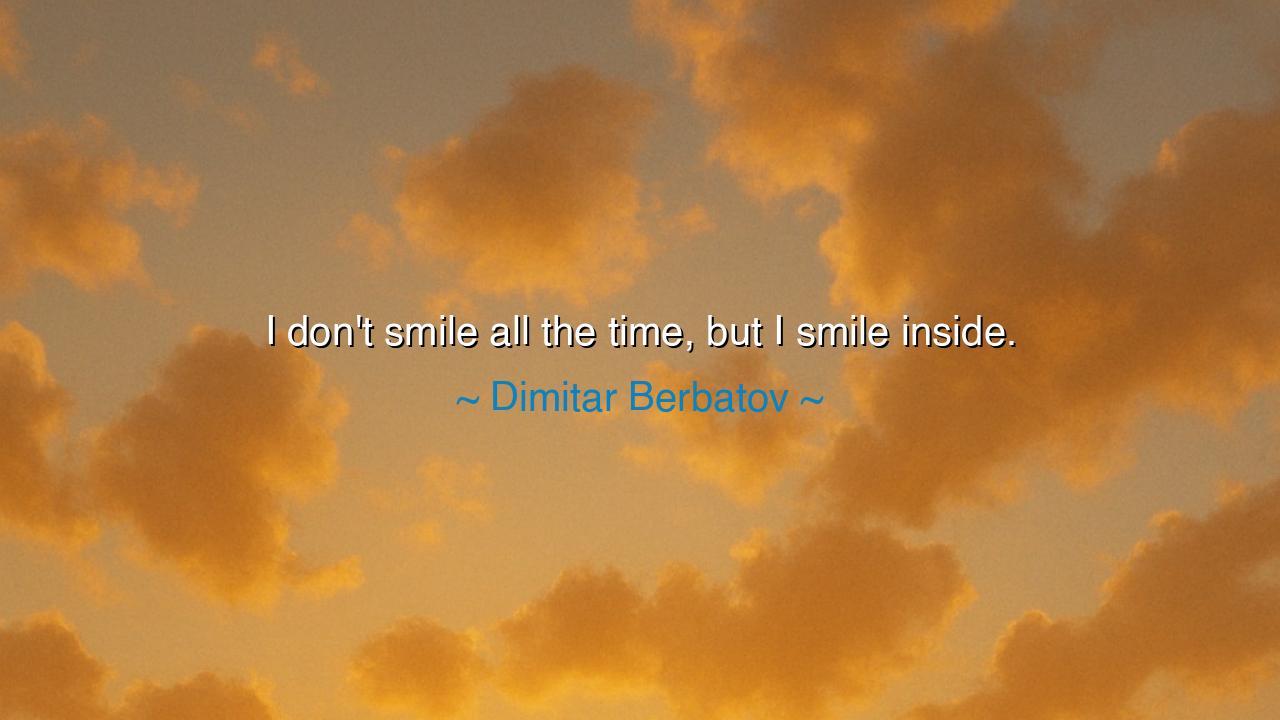
I don't smile all the time, but I smile inside.






The words of Dimitar Berbatov are quiet, almost understated, yet they carry the depth of a river flowing unseen beneath the earth: “I don’t smile all the time, but I smile inside.” In them lies the wisdom of one who has been misunderstood by appearances, yet who knows that true joy and serenity need not always be displayed outwardly. He speaks of an inner smile, a peace of the heart, a private radiance that does not depend upon the gaze of others.
To smile outwardly is to offer a gift to the world, but to smile inwardly is to preserve strength within the self. Berbatov, known for his calm demeanor on the football pitch, was often mistaken for cold or detached. Yet in these words, he reveals that beneath the calm exterior lay an inner flame, a contentment and joy invisible to the eye. This is a profound reminder that not all who seem solemn are joyless, and not all who seem cheerful are at peace. True joy is not always a performance—it can dwell silently in the heart.
The ancients knew this truth well. The Stoic philosophers of Greece and Rome spoke of ataraxia, the inner tranquility that cannot be shaken by outward storms. Marcus Aurelius, emperor and philosopher, often appeared grave to those around him, yet his writings reveal an inward smile born of wisdom, resilience, and acceptance of life’s trials. Like Berbatov, he taught that happiness is not the mask worn upon the face but the harmony cultivated within the soul.
Consider too the story of Mona Lisa, whose enigmatic smile has captivated the world for centuries. Her expression is not broad nor obvious, but subtle, hidden, and inward. It is the smile of one whose joy is not for show but for self, a mystery that draws the gaze of all who behold it. In much the same way, Berbatov reminds us that the quiet joys of the heart are often more enduring than the loud laughter of the crowd.
His words also challenge a world that demands constant expression. In an age where smiles are expected on stage, in sport, in life itself, Berbatov declares that he will not feign for others. Instead, he holds fast to his inner smile, authentic and unforced. This is not aloofness—it is integrity. It is the courage to say: “I may not show you what you expect, but within myself, I carry peace.” Such authenticity is a rare strength, for it resists the pressure of appearances and honors the truth of the soul.
The lesson for us is clear: cultivate your inner joy, and do not let the judgment of others rob you of authenticity. You need not wear a smile at every moment to prove your happiness. Instead, build within yourself the deeper smile—the one born of gratitude, self-knowledge, and acceptance. For the world’s eyes may misread you, but the truth within will sustain you when outward masks fade.
Practically, this means learning to sit quietly with yourself and find reasons to smile inwardly. Reflect on blessings, however small. Take pride in the dignity of your own journey. When you walk into the world, do not feel forced to perform happiness for the approval of others. Let your joy be real, whether shown or hidden. And when you do choose to share it outwardly, let it be a true reflection of your inward smile, not a mask demanded by others.
Thus, remember the teaching of Dimitar Berbatov: true joy begins within. Do not judge others by the expression on their face, for you do not know the smile that may live in their hearts. And for yourself, seek not to impress the world with endless cheer, but to carry the quiet strength of inner contentment. For the inner smile, though unseen, is eternal, and it will shine through your life in ways more powerful than the brightest grin.






AAdministratorAdministrator
Welcome, honored guests. Please leave a comment, we will respond soon